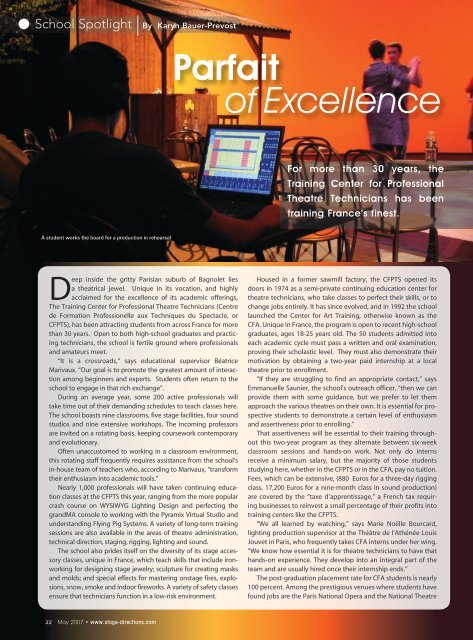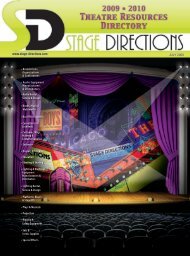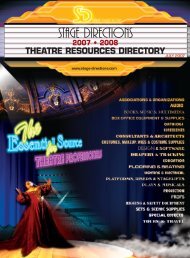May Issue - Stage Directions Magazine
May Issue - Stage Directions Magazine
May Issue - Stage Directions Magazine
Create successful ePaper yourself
Turn your PDF publications into a flip-book with our unique Google optimized e-Paper software.
School Spotlight<br />
By Karyn Bauer-Prevost<br />
Parfait<br />
of Excellence<br />
For more than 30 years, the<br />
Training Center for Professional<br />
Theatre Technicians has been<br />
training France’s finest.<br />
A student works the board for a production in rehearsal<br />
Deep inside the gritty Parisian suburb of Bagnolet lies<br />
a theatrical jewel. Unique in its vocation, and highly<br />
acclaimed for the excellence of its academic offerings,<br />
The Training Center for Professional Theatre Technicians (Centre<br />
de Formation Professionelle aux Techniques du Spectacle, or<br />
CFPTS), has been attracting students from across France for more<br />
than 30 years. Open to both high-school graduates and practicing<br />
technicians, the school is fertile ground where professionals<br />
and amateurs meet.<br />
“It is a crossroads,” says educational supervisor Béatrice<br />
Marivaux. “Our goal is to promote the greatest amount of interaction<br />
among beginners and experts. Students often return to the<br />
school to engage in that rich exchange”.<br />
During an average year, some 200 active professionals will<br />
take time out of their demanding schedules to teach classes here.<br />
The school boasts nine classrooms, five stage facilities, four sound<br />
studios and nine extensive workshops. The incoming professors<br />
are invited on a rotating basis, keeping coursework contemporary<br />
and evolutionary.<br />
Often unaccustomed to working in a classroom environment,<br />
this rotating staff frequently requires assistance from the school’s<br />
in-house team of teachers who, according to Marivaux, “transform<br />
their enthusiasm into academic tools.”<br />
Nearly 1,000 professionals will have taken continuing education<br />
classes at the CFPTS this year, ranging from the more popular<br />
crash course on WYSIWYG Lighting Design and perfecting the<br />
grandMA console to working with the Pyramix Virtual Studio and<br />
understanding Flying Pig Systems. A variety of long-term training<br />
sessions are also available in the areas of theatre administration,<br />
technical direction, staging, rigging, lighting and sound.<br />
The school also prides itself on the diversity of its stage accessory<br />
classes, unique in France, which teach skills that include ironworking<br />
for designing stage jewelry; sculpture for creating masks<br />
and molds; and special effects for mastering onstage fires, explosions,<br />
snow, smoke and indoor fireworks. A variety of safety classes<br />
ensure that technicians function in a low-risk environment.<br />
Housed in a former sawmill factory, the CFPTS opened its<br />
doors in 1974 as a semi-private continuing education center for<br />
theatre technicians, who take classes to perfect their skills, or to<br />
change jobs entirely. It has since evolved, and in 1992 the school<br />
launched the Center for Art Training, otherwise known as the<br />
CFA. Unique in France, the program is open to recent high-school<br />
graduates, ages 18-25 years old. The 50 students admitted into<br />
each academic cycle must pass a written and oral examination,<br />
proving their scholastic level. They must also demonstrate their<br />
motivation by obtaining a two-year paid internship at a local<br />
theatre prior to enrollment.<br />
“If they are struggling to find an appropriate contact,” says<br />
Emmanuelle Saunier, the school’s outreach officer, “then we can<br />
provide them with some guidance, but we prefer to let them<br />
approach the various theatres on their own. It is essential for prospective<br />
students to demonstrate a certain level of enthusiasm<br />
and assertiveness prior to enrolling.”<br />
That assertiveness will be essential to their training throughout<br />
this two-year program as they alternate between six-week<br />
classroom sessions and hands-on work. Not only do interns<br />
receive a minimum salary, but the majority of those students<br />
studying here, whether in the CFPTS or in the CFA, pay no tuition.<br />
Fees, which can be extensive, (880€ Euros for a three-day rigging<br />
class, 17,200 Euros for a nine-month class in sound production)<br />
are covered by the “taxe d’apprentissage,” a French tax requiring<br />
businesses to reinvest a small percentage of their profits into<br />
training centers like the CFPTS.<br />
“We all learned by watching,” says Marie Noëlle Bourcard,<br />
lighting production supervisor at the Théâtre de l’Athénée Louis<br />
Jouvet in Paris, who frequently takes CFA interns under her wing.<br />
“We know how essential it is for theatre technicians to have that<br />
hands-on experience. They develop into an integral part of the<br />
team and are usually hired once their internship ends.”<br />
The post-graduation placement rate for CFA students is nearly<br />
100 percent. Among the prestigious venues where students have<br />
found jobs are the Paris National Opera and the National Theatre<br />
22 <strong>May</strong> 2007 • www.stage-directions.com

















